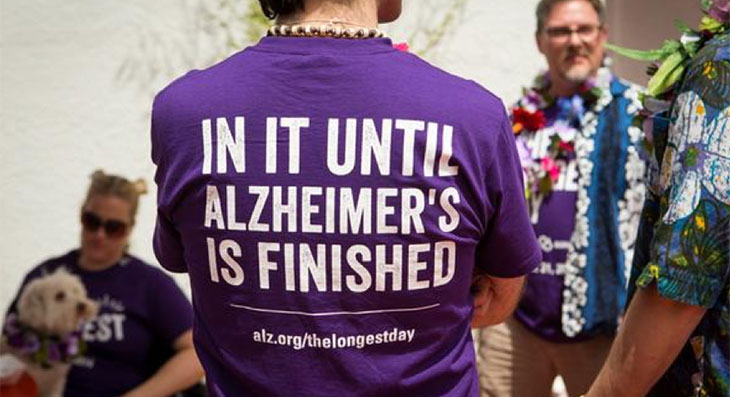June is Alzheimer’s and Brain Awareness month. Alzheimer’s disease affects 47 million people worldwide and 5 million Americans. Age is the greatest risk factor for developing the disease and 2/3 of American’s with Alzheimer’s are women. The epidemic of Alzheimer’s disease is growing significantly. Every 67 seconds someone in the United States develops dementia. Alzheimer’s is the sixth leading cause of death and is the only cause of death in the top 10 that can’t be prevented, cured or slowed. The cost of Alzheimer’s is staggering. In 2015, Alzheimer’s and other dementias cost the nation $226 billion; but without an effective therapy to prevent or slow the disease, the costs will be $1.1 trillion by 2050.
Alzheimer’s disease is thought to be “an old person’s disease” and while it is true that age is the greatest risk factor for developing the disease, another risk factor is putting the military at increased risk of developing dementia. While the aging Veteran population is at risk for developing dementia by fact that they are getting older, Servicemembers and young Veterans are also at increased risk. The effects of modern war, impact of head injury, post-traumatic stress disorder and other related factors war related factors such as chemical exposures, lifestyle risks and chronic medical conditions can contribute to the increased risk over their lifetime.
Alzheimer’s & Dementia: The Journal of the Alzheimer’s Association published a special issue in June 2014 focusing on research compiled on military risk factors for dementia. The outcome of modern military conflicts has focused on brain injury and brain health due to the impact of improvised explosive devices in Iraq and Afghanistan and the quarter million cases of mild traumatic brain injury since 2000. Based on this research conducted, there is a connection between TBI, PTSD, other military-related factors and risk of cognitive decline and dementia. However, the exact connection is still being researched.
The Alzheimer’s Association, the world’s leading voluntary health organization in Alzheimer’s care, support and research and is leading the charge to make Alzheimer’s disease and other related dementia’s a national priority. The first ever U.S. National Plan to Address Alzheimer’s disease has a goal of preventing and effectively treating Alzheimer’s disease by 2025. Without intervention, the number of people with Alzheimer’s and related dementias is expected to triple to 15 million by 2050 and with surging Veteran population that number may be even higher.
TAKE THE PURPLE PLEDGE
Worldwide, 47 million people are living with Alzheimer’s and other dementias.
Help turn the world purple. Commit to raising awareness in June for Alzheimer’s & Brain Awareness Month at alz.org/pledge.
 Susan Spivock Smith PhD, CRNP, is the clinical lead for VA’s Compensation and Pension program at Camp LeJeune. She also serves as a volunteer, ambassador, advocate and community educator promoting Alzheimer’s awareness.
Susan Spivock Smith PhD, CRNP, is the clinical lead for VA’s Compensation and Pension program at Camp LeJeune. She also serves as a volunteer, ambassador, advocate and community educator promoting Alzheimer’s awareness.Topics in this story
More Stories
Veteran Byron Potier weighed almost 300 pounds and was tired and lethargic. He was the perfect candidate for gastric sleeve surgery.
How much do you know about VA care, benefits and services? Don’t miss out on what you've earned—check out the "2025 VA Federal Benefits Guide for Veterans, Dependents, Survivors, and Caregivers" handbook to learn more.
Feeling stressed? Your breath can help you relax and focus. Take 3 minutes to reset and prioritize your well being for this week's #LiveWholeHealth practice.









June is also PTSD Awareness Month. See http://www.ptsd.va.gov.
Will I received head injury1977 I get nasty headaches , when weather fronts move in, there are some antidepressants drugs I can not take nasty side effects , even if I drink a bar drink, I feel it left side of head. I deal with it daily and doctors refused listen to me when I’m in bad days with in va today, big brother over looks these doctor and the doctor can’t give proper meds out, but give meds to vets cause other problems, they need to review the narcotics drug again, they can give out but u need see doc ever 30 days. So I hope some doctor out thier help out.
Great efforts here. It is really helpful to have a whole month dedicated to educating people about Alzheimer’s disease and dementia. My father has been researching this field for over 50 years and I do everything I can to help him develop his memory screening tests to help detect dementia early. It would be great to see some more progress in the fight to improve brain health!
This is a well written article that helps me (as a hemorrhagic stroker) to keep aware of the progress (if any) in Alzheimer research. I have slowly increasing memory problems that may be related to alz., and wonder if any research has been done in these areas? There are very few survivors of this rarer kind of stroke, so there is only “feely-good” advice about how to avoid another stroke (other than “Keep your blood pressure low”). I was keeping it around 115 with meds when I had the stroke, so something raised it temporarily. If I am developing Alz, I will probably forget to be relaxed when dealing with constipation which raises BP. (check into what killed Elvis and many others).